Health Care Role Concept: Analysis of Workplace Dynamics
VerifiedAdded on 2022/12/15
|5
|1498
|388
Report
AI Summary
This report analyzes the role concept within a healthcare setting, focusing on a case study involving an employee named Carl. The analysis explores the impact of unmet needs, such as lack of attention and individual time, on Carl's well-being and job satisfaction. The report examines how these factors contribute to stress, psychological issues, and coping mechanisms, such as alcohol consumption. Furthermore, the report assesses the organization's time management practices and identifies areas for improvement, including better task distribution and mentorship. The analysis references several academic sources to support its claims, highlighting the importance of addressing employee needs to improve productivity and overall workplace dynamics. The report concludes with a discussion on the role of effective time management and communication in fostering a healthier work environment.
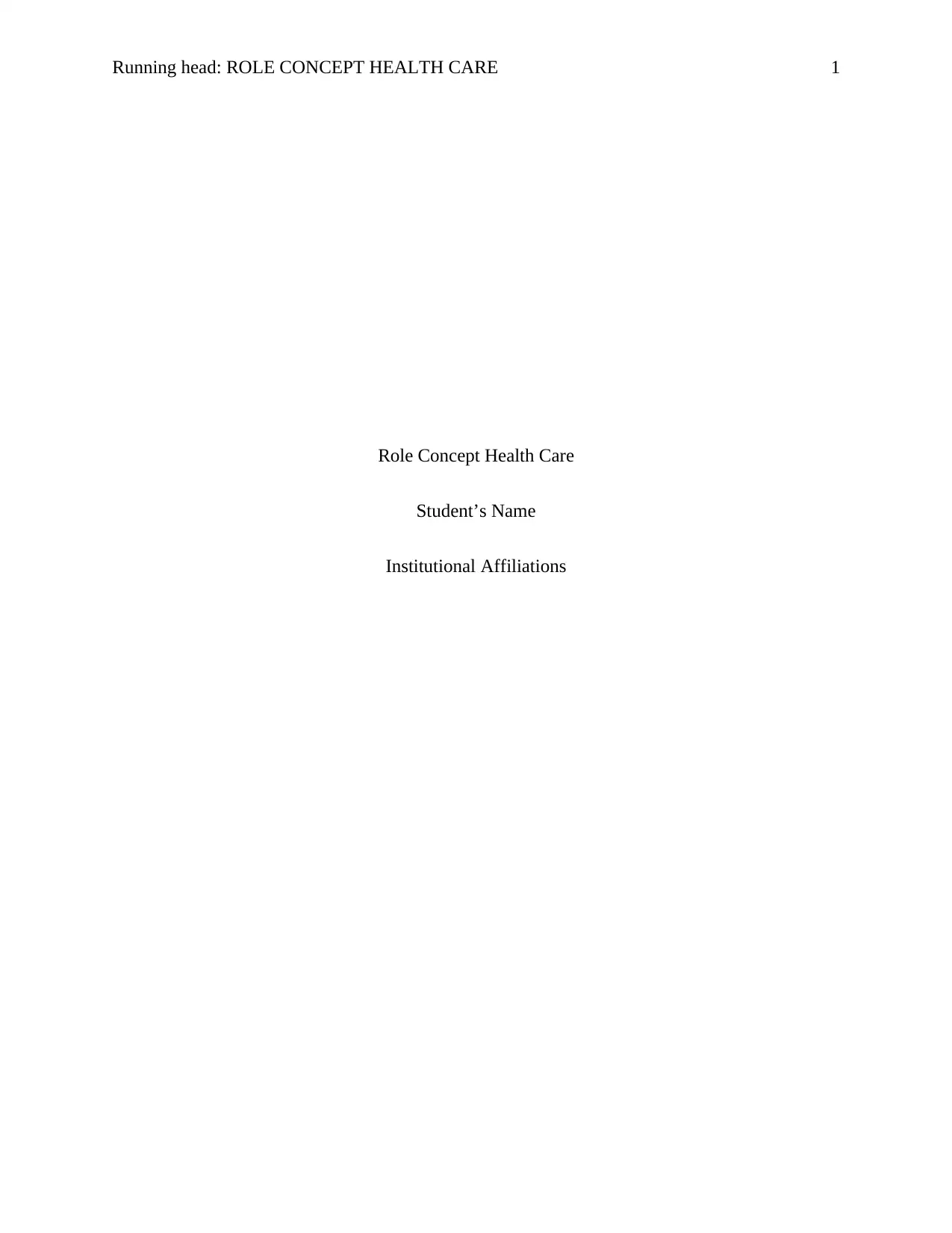
Running head: ROLE CONCEPT HEALTH CARE 1
Role Concept Health Care
Student’s Name
Institutional Affiliations
Role Concept Health Care
Student’s Name
Institutional Affiliations
Paraphrase This Document
Need a fresh take? Get an instant paraphrase of this document with our AI Paraphraser
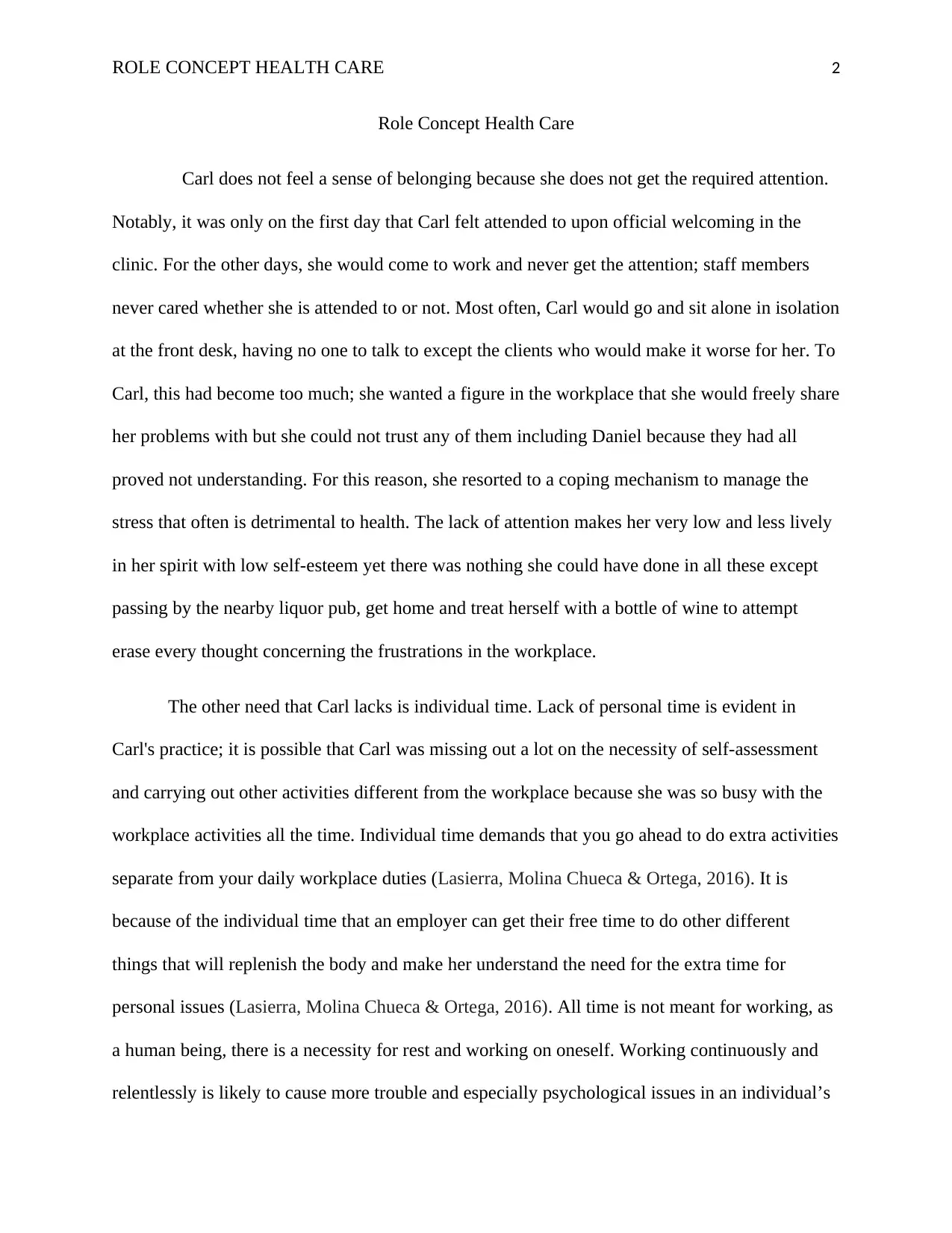
ROLE CONCEPT HEALTH CARE 2
Role Concept Health Care
Carl does not feel a sense of belonging because she does not get the required attention.
Notably, it was only on the first day that Carl felt attended to upon official welcoming in the
clinic. For the other days, she would come to work and never get the attention; staff members
never cared whether she is attended to or not. Most often, Carl would go and sit alone in isolation
at the front desk, having no one to talk to except the clients who would make it worse for her. To
Carl, this had become too much; she wanted a figure in the workplace that she would freely share
her problems with but she could not trust any of them including Daniel because they had all
proved not understanding. For this reason, she resorted to a coping mechanism to manage the
stress that often is detrimental to health. The lack of attention makes her very low and less lively
in her spirit with low self-esteem yet there was nothing she could have done in all these except
passing by the nearby liquor pub, get home and treat herself with a bottle of wine to attempt
erase every thought concerning the frustrations in the workplace.
The other need that Carl lacks is individual time. Lack of personal time is evident in
Carl's practice; it is possible that Carl was missing out a lot on the necessity of self-assessment
and carrying out other activities different from the workplace because she was so busy with the
workplace activities all the time. Individual time demands that you go ahead to do extra activities
separate from your daily workplace duties (Lasierra, Molina Chueca & Ortega, 2016). It is
because of the individual time that an employer can get their free time to do other different
things that will replenish the body and make her understand the need for the extra time for
personal issues (Lasierra, Molina Chueca & Ortega, 2016). All time is not meant for working, as
a human being, there is a necessity for rest and working on oneself. Working continuously and
relentlessly is likely to cause more trouble and especially psychological issues in an individual’s
Role Concept Health Care
Carl does not feel a sense of belonging because she does not get the required attention.
Notably, it was only on the first day that Carl felt attended to upon official welcoming in the
clinic. For the other days, she would come to work and never get the attention; staff members
never cared whether she is attended to or not. Most often, Carl would go and sit alone in isolation
at the front desk, having no one to talk to except the clients who would make it worse for her. To
Carl, this had become too much; she wanted a figure in the workplace that she would freely share
her problems with but she could not trust any of them including Daniel because they had all
proved not understanding. For this reason, she resorted to a coping mechanism to manage the
stress that often is detrimental to health. The lack of attention makes her very low and less lively
in her spirit with low self-esteem yet there was nothing she could have done in all these except
passing by the nearby liquor pub, get home and treat herself with a bottle of wine to attempt
erase every thought concerning the frustrations in the workplace.
The other need that Carl lacks is individual time. Lack of personal time is evident in
Carl's practice; it is possible that Carl was missing out a lot on the necessity of self-assessment
and carrying out other activities different from the workplace because she was so busy with the
workplace activities all the time. Individual time demands that you go ahead to do extra activities
separate from your daily workplace duties (Lasierra, Molina Chueca & Ortega, 2016). It is
because of the individual time that an employer can get their free time to do other different
things that will replenish the body and make her understand the need for the extra time for
personal issues (Lasierra, Molina Chueca & Ortega, 2016). All time is not meant for working, as
a human being, there is a necessity for rest and working on oneself. Working continuously and
relentlessly is likely to cause more trouble and especially psychological issues in an individual’s
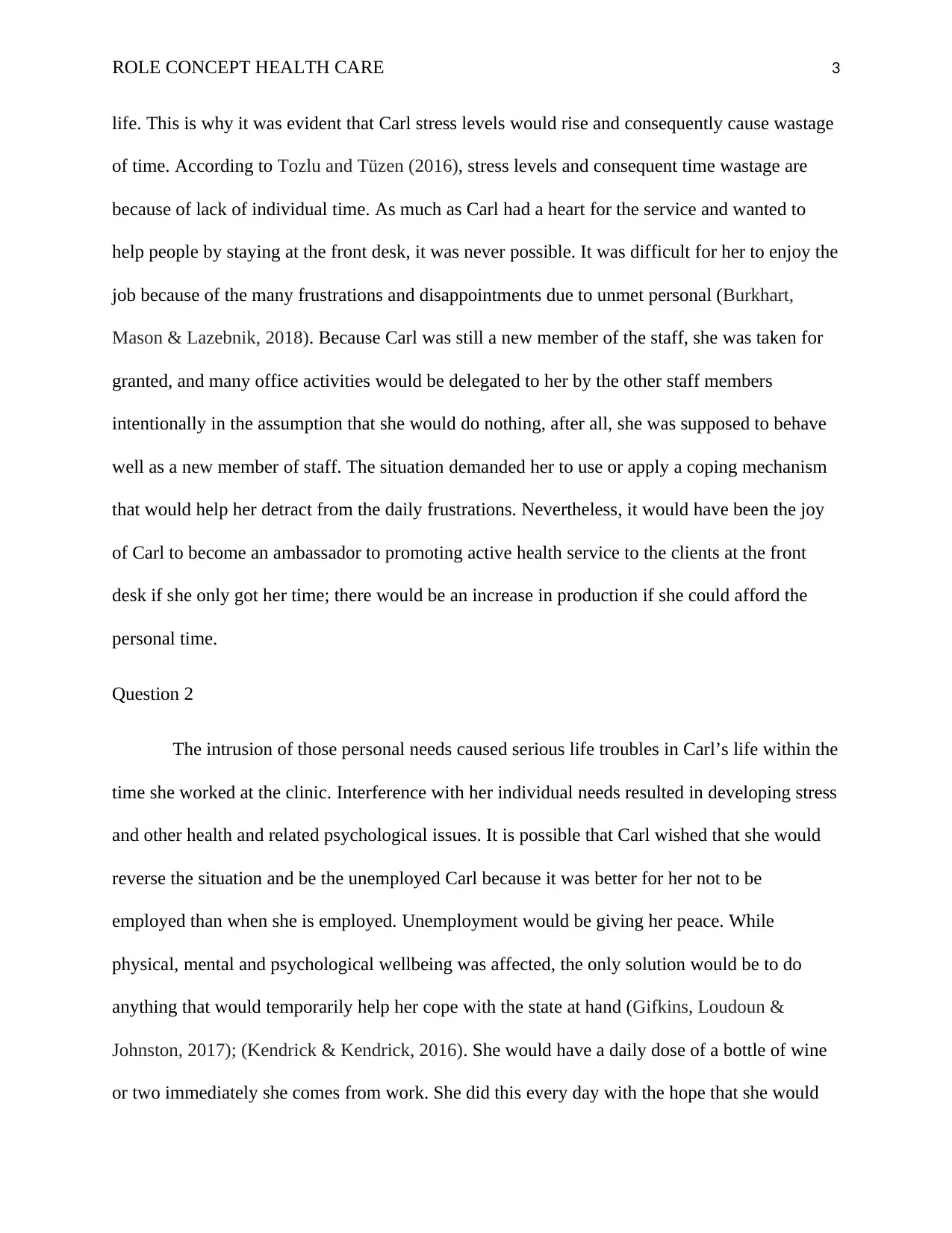
ROLE CONCEPT HEALTH CARE 3
life. This is why it was evident that Carl stress levels would rise and consequently cause wastage
of time. According to Tozlu and Tüzen (2016), stress levels and consequent time wastage are
because of lack of individual time. As much as Carl had a heart for the service and wanted to
help people by staying at the front desk, it was never possible. It was difficult for her to enjoy the
job because of the many frustrations and disappointments due to unmet personal (Burkhart,
Mason & Lazebnik, 2018). Because Carl was still a new member of the staff, she was taken for
granted, and many office activities would be delegated to her by the other staff members
intentionally in the assumption that she would do nothing, after all, she was supposed to behave
well as a new member of staff. The situation demanded her to use or apply a coping mechanism
that would help her detract from the daily frustrations. Nevertheless, it would have been the joy
of Carl to become an ambassador to promoting active health service to the clients at the front
desk if she only got her time; there would be an increase in production if she could afford the
personal time.
Question 2
The intrusion of those personal needs caused serious life troubles in Carl’s life within the
time she worked at the clinic. Interference with her individual needs resulted in developing stress
and other health and related psychological issues. It is possible that Carl wished that she would
reverse the situation and be the unemployed Carl because it was better for her not to be
employed than when she is employed. Unemployment would be giving her peace. While
physical, mental and psychological wellbeing was affected, the only solution would be to do
anything that would temporarily help her cope with the state at hand (Gifkins, Loudoun &
Johnston, 2017); (Kendrick & Kendrick, 2016). She would have a daily dose of a bottle of wine
or two immediately she comes from work. She did this every day with the hope that she would
life. This is why it was evident that Carl stress levels would rise and consequently cause wastage
of time. According to Tozlu and Tüzen (2016), stress levels and consequent time wastage are
because of lack of individual time. As much as Carl had a heart for the service and wanted to
help people by staying at the front desk, it was never possible. It was difficult for her to enjoy the
job because of the many frustrations and disappointments due to unmet personal (Burkhart,
Mason & Lazebnik, 2018). Because Carl was still a new member of the staff, she was taken for
granted, and many office activities would be delegated to her by the other staff members
intentionally in the assumption that she would do nothing, after all, she was supposed to behave
well as a new member of staff. The situation demanded her to use or apply a coping mechanism
that would help her detract from the daily frustrations. Nevertheless, it would have been the joy
of Carl to become an ambassador to promoting active health service to the clients at the front
desk if she only got her time; there would be an increase in production if she could afford the
personal time.
Question 2
The intrusion of those personal needs caused serious life troubles in Carl’s life within the
time she worked at the clinic. Interference with her individual needs resulted in developing stress
and other health and related psychological issues. It is possible that Carl wished that she would
reverse the situation and be the unemployed Carl because it was better for her not to be
employed than when she is employed. Unemployment would be giving her peace. While
physical, mental and psychological wellbeing was affected, the only solution would be to do
anything that would temporarily help her cope with the state at hand (Gifkins, Loudoun &
Johnston, 2017); (Kendrick & Kendrick, 2016). She would have a daily dose of a bottle of wine
or two immediately she comes from work. She did this every day with the hope that she would
⊘ This is a preview!⊘
Do you want full access?
Subscribe today to unlock all pages.

Trusted by 1+ million students worldwide
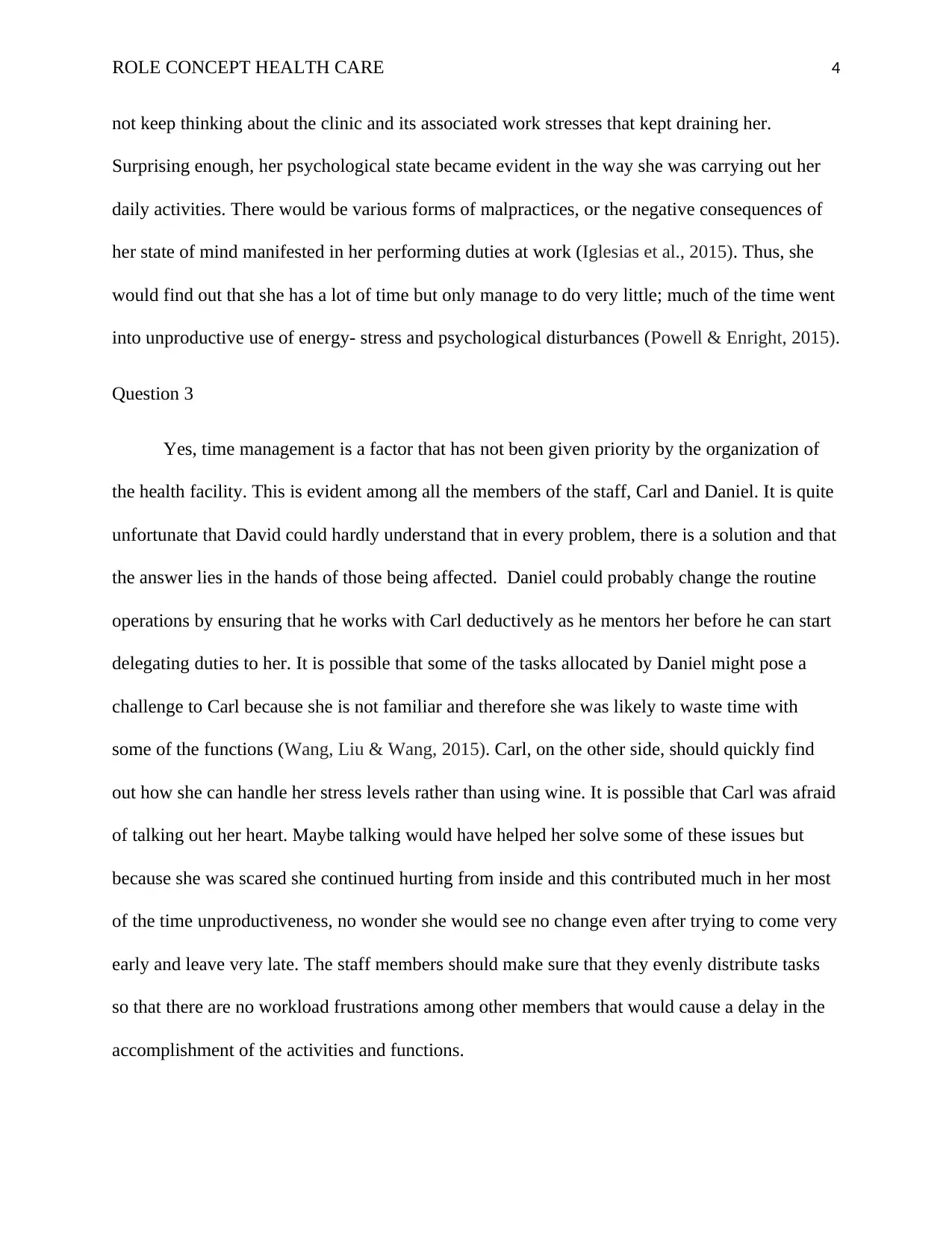
ROLE CONCEPT HEALTH CARE 4
not keep thinking about the clinic and its associated work stresses that kept draining her.
Surprising enough, her psychological state became evident in the way she was carrying out her
daily activities. There would be various forms of malpractices, or the negative consequences of
her state of mind manifested in her performing duties at work (Iglesias et al., 2015). Thus, she
would find out that she has a lot of time but only manage to do very little; much of the time went
into unproductive use of energy- stress and psychological disturbances (Powell & Enright, 2015).
Question 3
Yes, time management is a factor that has not been given priority by the organization of
the health facility. This is evident among all the members of the staff, Carl and Daniel. It is quite
unfortunate that David could hardly understand that in every problem, there is a solution and that
the answer lies in the hands of those being affected. Daniel could probably change the routine
operations by ensuring that he works with Carl deductively as he mentors her before he can start
delegating duties to her. It is possible that some of the tasks allocated by Daniel might pose a
challenge to Carl because she is not familiar and therefore she was likely to waste time with
some of the functions (Wang, Liu & Wang, 2015). Carl, on the other side, should quickly find
out how she can handle her stress levels rather than using wine. It is possible that Carl was afraid
of talking out her heart. Maybe talking would have helped her solve some of these issues but
because she was scared she continued hurting from inside and this contributed much in her most
of the time unproductiveness, no wonder she would see no change even after trying to come very
early and leave very late. The staff members should make sure that they evenly distribute tasks
so that there are no workload frustrations among other members that would cause a delay in the
accomplishment of the activities and functions.
not keep thinking about the clinic and its associated work stresses that kept draining her.
Surprising enough, her psychological state became evident in the way she was carrying out her
daily activities. There would be various forms of malpractices, or the negative consequences of
her state of mind manifested in her performing duties at work (Iglesias et al., 2015). Thus, she
would find out that she has a lot of time but only manage to do very little; much of the time went
into unproductive use of energy- stress and psychological disturbances (Powell & Enright, 2015).
Question 3
Yes, time management is a factor that has not been given priority by the organization of
the health facility. This is evident among all the members of the staff, Carl and Daniel. It is quite
unfortunate that David could hardly understand that in every problem, there is a solution and that
the answer lies in the hands of those being affected. Daniel could probably change the routine
operations by ensuring that he works with Carl deductively as he mentors her before he can start
delegating duties to her. It is possible that some of the tasks allocated by Daniel might pose a
challenge to Carl because she is not familiar and therefore she was likely to waste time with
some of the functions (Wang, Liu & Wang, 2015). Carl, on the other side, should quickly find
out how she can handle her stress levels rather than using wine. It is possible that Carl was afraid
of talking out her heart. Maybe talking would have helped her solve some of these issues but
because she was scared she continued hurting from inside and this contributed much in her most
of the time unproductiveness, no wonder she would see no change even after trying to come very
early and leave very late. The staff members should make sure that they evenly distribute tasks
so that there are no workload frustrations among other members that would cause a delay in the
accomplishment of the activities and functions.
Paraphrase This Document
Need a fresh take? Get an instant paraphrase of this document with our AI Paraphraser
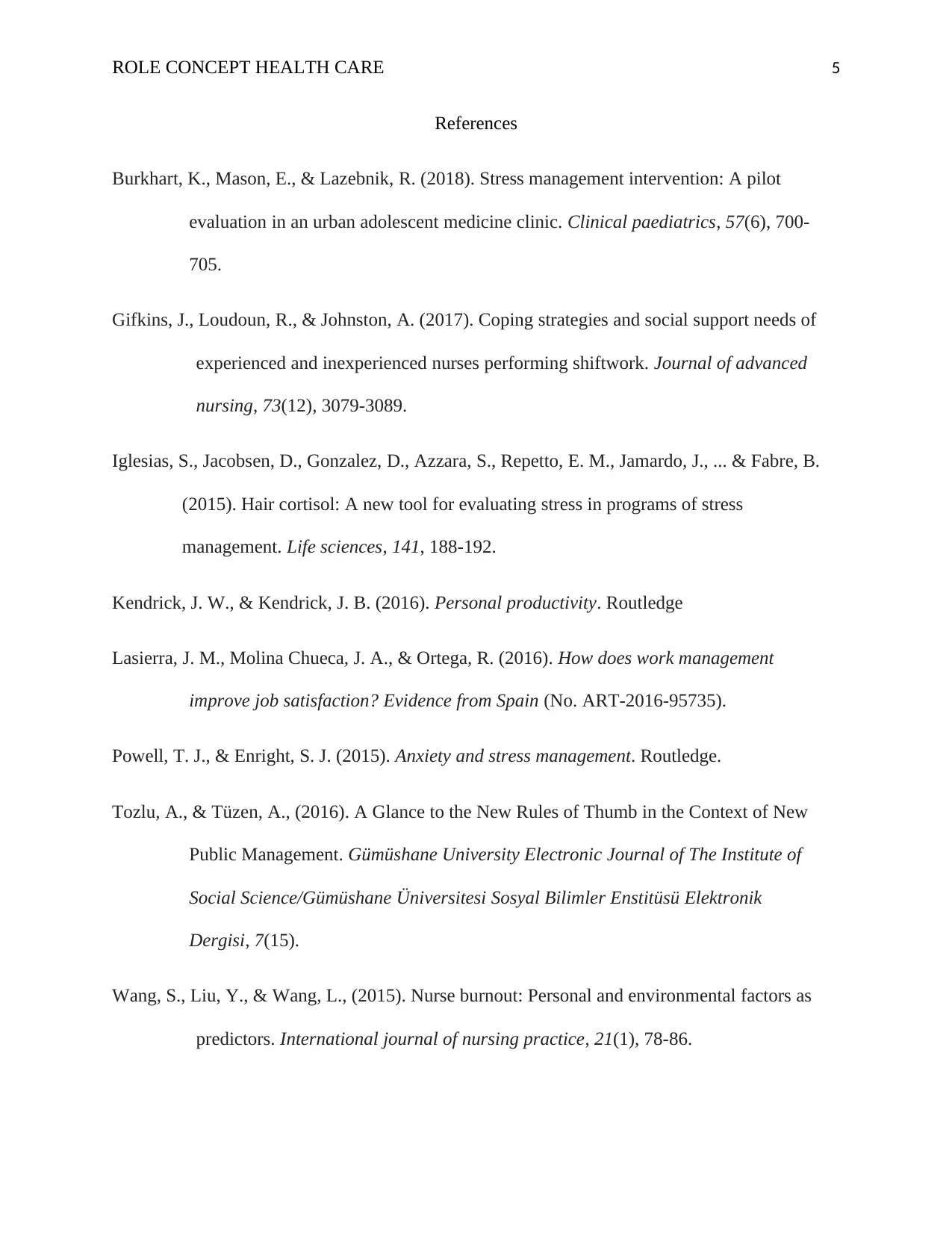
ROLE CONCEPT HEALTH CARE 5
References
Burkhart, K., Mason, E., & Lazebnik, R. (2018). Stress management intervention: A pilot
evaluation in an urban adolescent medicine clinic. Clinical paediatrics, 57(6), 700-
705.
Gifkins, J., Loudoun, R., & Johnston, A. (2017). Coping strategies and social support needs of
experienced and inexperienced nurses performing shiftwork. Journal of advanced
nursing, 73(12), 3079-3089.
Iglesias, S., Jacobsen, D., Gonzalez, D., Azzara, S., Repetto, E. M., Jamardo, J., ... & Fabre, B.
(2015). Hair cortisol: A new tool for evaluating stress in programs of stress
management. Life sciences, 141, 188-192.
Kendrick, J. W., & Kendrick, J. B. (2016). Personal productivity. Routledge
Lasierra, J. M., Molina Chueca, J. A., & Ortega, R. (2016). How does work management
improve job satisfaction? Evidence from Spain (No. ART-2016-95735).
Powell, T. J., & Enright, S. J. (2015). Anxiety and stress management. Routledge.
Tozlu, A., & Tüzen, A., (2016). A Glance to the New Rules of Thumb in the Context of New
Public Management. Gümüshane University Electronic Journal of The Institute of
Social Science/Gümüshane Üniversitesi Sosyal Bilimler Enstitüsü Elektronik
Dergisi, 7(15).
Wang, S., Liu, Y., & Wang, L., (2015). Nurse burnout: Personal and environmental factors as
predictors. International journal of nursing practice, 21(1), 78-86.
References
Burkhart, K., Mason, E., & Lazebnik, R. (2018). Stress management intervention: A pilot
evaluation in an urban adolescent medicine clinic. Clinical paediatrics, 57(6), 700-
705.
Gifkins, J., Loudoun, R., & Johnston, A. (2017). Coping strategies and social support needs of
experienced and inexperienced nurses performing shiftwork. Journal of advanced
nursing, 73(12), 3079-3089.
Iglesias, S., Jacobsen, D., Gonzalez, D., Azzara, S., Repetto, E. M., Jamardo, J., ... & Fabre, B.
(2015). Hair cortisol: A new tool for evaluating stress in programs of stress
management. Life sciences, 141, 188-192.
Kendrick, J. W., & Kendrick, J. B. (2016). Personal productivity. Routledge
Lasierra, J. M., Molina Chueca, J. A., & Ortega, R. (2016). How does work management
improve job satisfaction? Evidence from Spain (No. ART-2016-95735).
Powell, T. J., & Enright, S. J. (2015). Anxiety and stress management. Routledge.
Tozlu, A., & Tüzen, A., (2016). A Glance to the New Rules of Thumb in the Context of New
Public Management. Gümüshane University Electronic Journal of The Institute of
Social Science/Gümüshane Üniversitesi Sosyal Bilimler Enstitüsü Elektronik
Dergisi, 7(15).
Wang, S., Liu, Y., & Wang, L., (2015). Nurse burnout: Personal and environmental factors as
predictors. International journal of nursing practice, 21(1), 78-86.
1 out of 5
Related Documents
Your All-in-One AI-Powered Toolkit for Academic Success.
+13062052269
info@desklib.com
Available 24*7 on WhatsApp / Email
![[object Object]](/_next/static/media/star-bottom.7253800d.svg)
Unlock your academic potential
Copyright © 2020–2026 A2Z Services. All Rights Reserved. Developed and managed by ZUCOL.





